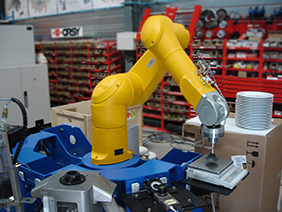Artificial intelligence (AI) is having a moment. With the success of computer systems like IBM’s Watson (the first AI to win at Jeopardy against human competitors) and now the “Amelia” program from tech company IPsoft, technology is accelerating changes in the labor market that could have widespread impacts on the nature of work.
Entrepreneurs and innovators argue that these changes will liberate workers from drudgery, but the consequences may be mixed. As consulting firm McKinsey has forecast, by 2025, such automated technologies could replace nearly 250 million workers around the world. While this may mean fewer repetitive and boring tasks, it also means that without additional education or retraining, many workers will be left without the means to either develop new skills or to start their own businesses.
 Most analysis of this phenomenon focuses on the obvious sectors: jobs on assembly lines and other routine functions. But the true impact will go far beyond that. Plenty of the professions–lawyers, accountants, even teachers and doctors–will be transformed, as any job based on interpreting predictable data could face displacement by artificial intelligence. Outsourcing will also be impacted, as the research firm Gartner estimates that IT costs will be reduced by 60 percent by 2017 thanks to these new technologies, leading fewer companies to ship such tasks overseas.
Most analysis of this phenomenon focuses on the obvious sectors: jobs on assembly lines and other routine functions. But the true impact will go far beyond that. Plenty of the professions–lawyers, accountants, even teachers and doctors–will be transformed, as any job based on interpreting predictable data could face displacement by artificial intelligence. Outsourcing will also be impacted, as the research firm Gartner estimates that IT costs will be reduced by 60 percent by 2017 thanks to these new technologies, leading fewer companies to ship such tasks overseas.
These realities have sparked an energetic conversation in the United States. Entrepreneur Martin Ford’s 2015 book Rise of the Robots: Technology and the Threat of a Jobless Future has drawn comment from across the political spectrum. Major magazines of ideas like The Atlantic and Foreign Affairs have featured the issue on their recent covers.
For Ford, a future defined by artificial intelligence is all but inevitable. “A fundamental shift in the relationship between workers and machines…will ultimately change one of our most basic assumptions about technology: that machines are tools that increase the productivity of workers,” he writes in Rise of the Robots. “Instead, machines themselves are turning into workers, and the line between the capability of labor and capital is blurring as never before.”
But even some of those at the leading edge of the technology revolution worry that it could go too far. “I think we should be very careful about artificial intelligence,” saidTesla and SpaceX cofounder Elon Musk last year. “If I had to guess at what our biggest existential threat is, it’s probably that. With artificial intelligence we are summoning the demon.” Musk’s comments echoed the warnings of Stephen Hawking and other scientists and inventors.
On the other side of the debate, supporters of artificial intelligence doubt that robots can ever replace human capital — the creativity, leadership, and problem solving that only humans can provide. Others point out that the dislocations that have already occurred due to AI technology are nothing compared to the invention of indoor lighting, electricity, and the telephone. More than 80 percent of Americans used to be farmers, for instance, but technology allowed people to leave the fields and dedicate their time to other pursuits, making everybody better off.
 As Erik Brynjolfsson and Andrew McAfee argue in their book The Second Machine Age, we should prepare for a similar transition. “It’s time to start discussing what kind of society we should construct around a labor-light economy,” they write. “How should the abundance of such an economy be shared?”
As Erik Brynjolfsson and Andrew McAfee argue in their book The Second Machine Age, we should prepare for a similar transition. “It’s time to start discussing what kind of society we should construct around a labor-light economy,” they write. “How should the abundance of such an economy be shared?”
Yet this conversation has found little traction in Latin America, despite the fact that artificial intelligence may have a particularly negative effect in the region. As trade expanded in the 1990s, much of Latin America’s textile industry left to set up shop in Asia. This pattern could repeat itself with automation, if the call centers, IT consultants, and the rest of the business processing outsourcing (BPO) industry in Latin America finds it cheaper to move back “home” to the United States.
That’s why its time for Latin American policymakers to pay attention to the potential impacts of these technologies, especially officials in education and healthcare, two of the largest employers in the region. Luciano Tourn, an executive director of the Argentine health services provider Grupo Gamma, points out that health systems need a large supply of highly-skilled human capital. For this sector, the challenge is not a lack of jobs, but a shortage of qualified workers. “In the coming years, it will be increasingly important for healthcare providers to be able to attract and retain top-tier talent,” Tourn says.
We can’t know yet whether artificial intelligence will immiserate the human race, as some foresee, or solve many of mankind’s most pressing problems, as techno-optimists argue. But it is clear that these technologies will bring transformative change of one sort or another to the world, and especially to Latin American societies. The region’s leaders must begin to prepare.

